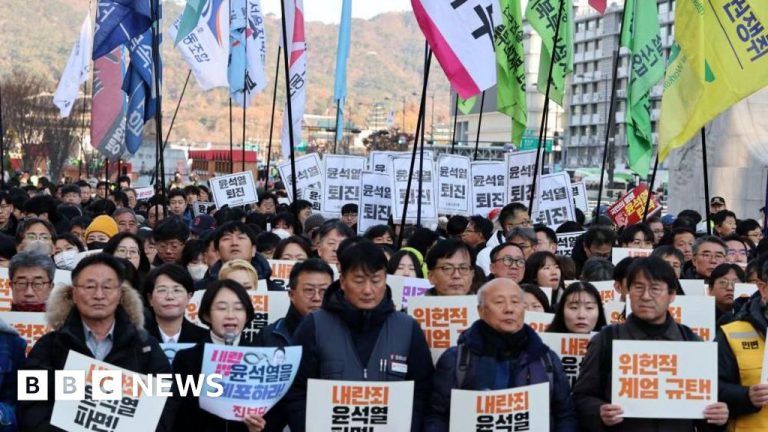EPA
“Stop Yoon Suk-yeol,” angry citizens chanted as they filled the streets
South Korean opposition lawmakers have initiated impeachment proceedings against President Yoon Suk Yeol following his failed attempt to impose martial law.
The country woke up to an uncertain reality on Wednesday after a night of unprecedented scenes that saw Yoon unexpectedly impose martial law, 190 lawmakers come together to reject it and a sudden reversal of the decision.
Parliament now has 72 hours from the filing of the impeachment motion to vote on whether to impeach Yoon.
South Korea's main opposition Democratic Party said Wednesday it wanted to charge him with “crimes of rebellion.”
Schools, banks and government offices in Seoul are operating as usual, but protests continue across the city.
“Stop Yoon Suk-yeol,” some angry citizens chanted as they filled the streets.
The Korean Confederation of Trade Unions, South Korea's largest labor organization, also pledged Wednesday to begin an indefinite strike until the president resigns.
The Democratic Party also named Defense Minister Kim Yong-hyun and Interior Minister Lee Sang-min as “key participants” in declaring martial law, saying it also wanted them to be indicted alongside Yoon.
“The (party) condemns the Yoon Seok Yeol regime's unconstitutional and illegal emergency martial law as a crime of rebellion,” party spokesperson Seung Rae-cho told reporters.
“I urge investigative agencies to immediately launch an investigation and bring the perpetrators to justice, as the entire nation is aware of the rebellion.”
Reuters
South Korean President Yoon Suk Yeol's declaration of martial law was unanimously rejected less than two hours later.
Wednesday's announcement comes after dramatic scenes overnight, during which some opposition MPs broke barricades and climbed fences to reach the voting hall.
Hundreds of soldiers stormed Parliament after Yoon declared martial law, while military helicopters flew overhead.
Thousands of protesters arrived at the gates of the National Assembly, as 190 MPs escaped police lines and forced their way inside to vote against the order.
His second announcement – that he was reversing his previous decision – was met with cheers from protesters outside the South Korean parliament.
On Wednesday, Yoon's top aides, including chief of staff Chung Jin-suk and national security adviser Shin Won-sik, tendered their resignations. It is unclear whether their resignations will be accepted.
The presidential office defended the initial decision to declare martial law as “strictly in accordance with (the country's) constitutional framework.” He said Wednesday the announcement was timed to “minimize damage” to the economy and people’s lives.
How are impeachments carried out in South Korea?
Once an impeachment bill is proposed, more than two-thirds of South Korea's 300-member National Assembly must vote for impeachment, equivalent to at least 201 votes. The vote must take place within 72 hours.
Once the impeachment is approved, the president will be immediately suspended from office, while the prime minister will become acting president.
A trial will then take place before the Constitutional Court, a nine-member council that oversees branches of South Korea's government.
If six of the court members vote in favor of impeachment, the president will be removed from office.
EPA
Police officers dressed in bright yellow vests stand guard outside the National Assembly in Seoul
Have other South Korean presidents been impeached?
In 2016, then-president Park Guen-hye was impeached after being accused of corruption, abuse of power and leaking state secrets.
In 2004, another South Korean president, Roh Moo-hyun, was impeached and suspended for two months. The Constitutional Court then reinstated him in his functions.
If Yoon resigns or is impeached, the government will have to hold elections within 60 days so that the country can elect its new leader, who will begin a new five-year term.
South Korea's history with martial law
Under South Korea's constitution, the president has the authority to declare martial law in the event of war, armed conflict or other national emergencies.
The last time martial law was declared in the country was in 1979, when longtime military dictator Park Chung-hee was assassinated in a coup.
A group of military leaders, led by General Chun Doo-hwan, declared martial law in 1980, banning political activities and arresting dissidents.
Hundreds of people died in the crackdown on protesters before martial law was lifted in 1981.
Martial law has not been invoked since South Korea became a parliamentary democracy in 1987.
Yoon pulled the trigger on Tuesday, saying he was trying to save the country from “anti-state forces.”
But some analysts described the move as an attempt to thwart political opposition.
Yoon has been a lame-duck president since the opposition won a landslide victory in the country's general election in April this year – his government has been unable to pass the laws he wanted and has been reduced to opposing veto bills proposed by the opposition.
The president's approval rating has reached a record 17% this year, as he and his wife Kim Keon-hee are mired in a series of scandals.
Additional reporting by Woongbee Lee in Seoul and Frances Mao in London

